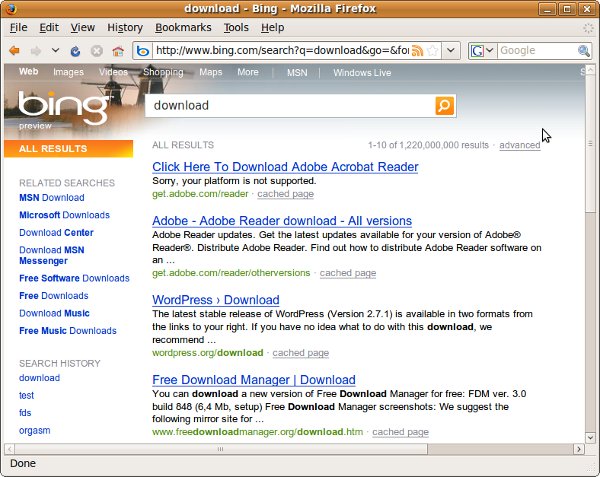So Microsoft’s new search engine Bing has been available for the general public for a few days. While I have read about Bing here and there, I decided to do some comparison myself between Bing and Google.
The Homepage
Depending on who you ask, you either love Google’s minimalist search home page or prefer a more colorful one like Bing. But we need to remember that the primary goal of a search engine is to perform search. Bing’s home page clearly followed Live’s footstep and as a result the main page is bloated. The home page for Bing comes at 31 Kb while Google’s is just above 4 Kb. (I used wget on both sites and compared the downloaded html, excluding images).
So Bing is at a disadvantage from the start. For the same data pipe size, Google can serve four times as many requests as Bing could. Put it another way: to achieve the same performance, Microsoft would need more resources to compete with Google.
Search Experience
On normal searches, Bing lives largely to the hype generated before its launch. It does a decent job in finding relevant results. Comparing the search results between Google and Bing on the same search terms, they are largely similar in terms of how they rank the pages.
Performance-wise, Bing holds up pretty well in general. But occasionally, you can experience a noticeable delay when returning results. Google on the other hand returns results uniformly fast.
Like its home page, the average size of Bing’s result pages is much larger than Google’s. Bing’s search result page (on search term “test”) is almost 40 Kb in size while Google’s result page remains under 5 Kb.
I often use searches on servers with a slow remote session and Bing would perform poorly compared with Google in such an environment (e.g. large page sizes).
Bing Is No Google
While for the most part Bing gets pretty good search results, I did find some rather poor results from certain search terms.
Try search the word download on Bing, here is the result you get:

I don’t know why the first couple of entries would be for Adobe Acrobat Readers. Google’s first entry points to CNet’s download site, which makes a lot more sense.
Now, try search “C–“ on Bing. C minus minus is no where to be found in the results.
If you wanted to find a little more about the TASM assembler, don’t count on it returning top on the list using Bing, even though the related searches contains related information.
The same thing goes for searching chemical compounds. Searching NH3 doesn’t return you any information about ammonia from the main search results.
Last but not least, Bing lacks the versatility interpreting mathematical equations. To calculate 2 to the 100 power for instance, one could use either 2^100 or 2**100. But using Bing, you are limited to only the first form.
So, to me it is doubtful that Bing would be help Microsoft increase its share in search in any significant way at least not in the near future.

